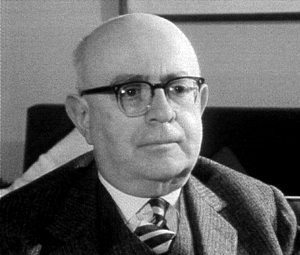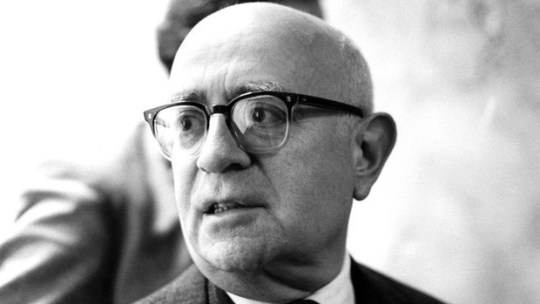Text
Timeline of Adorno’s Publications
Click here!
I made a timeline of the publications of Adorno’s work. Click the boxes when you’re there to see the title of the work!
1 note
·
View note
Video
youtube
Clips of Adorno and Horkheimer in interviews
0 notes
Text
Theodor Adorno Narrative for World Literature 304 By: Ashley Singh
Parents Maria Calvalli-Adorno and Oskar Wiesengrund welcomed to the world their son Theodor Wiesengrund Adorno on September 11, 1903 in Frankfurt, Germany. His mother, Maria, was a musically talented singer of Italian-Catholic descent. His father Oskar was an assimilated Jewish wine merchant.
A part of Adorno’s youthood was having to grow up and experience World War 1 from July 28, 1914 – November 11, 1918. During this time:
“after the assassination of Archduke Franz Ferdinand …Germany, Austria-Hungary, Bulgaria and the Ottoman Empire (the Central Powers) fought against Great Britain, France, Russia, Italy, Romania, Japan and the United States (the Allied Powers). Thanks to new military technologies and the horrors of trench warfare, World War I saw unprecedented levels of carnage and destruction. By the time the war was over and the Allied Powers claimed victory, more than 16 million people—soldiers and civilians alike—were dead.” (https://www.history.com/topics/world-war-i/world-war-i-history)
A part from a demoralizing loss of Germany in WW1, the Spanish Flu struck and became a global pandemic in 1918. Growing up, Adorno was a musically and academically gifted child. In the early to mid 1920s – at the age of 17, onward – Adorno enrolled in the Frankfurt University where he studied philosophy, psychology, sociology, and music. He initially seemed destined for a career in music as he took his childhood talents into his unversity years and spent 2 years in Vienna studying under composers such as Alban Berg and Arnold Schoenberg. His interested later shifted to the philosophy/sociology/psychology spectrum.
In 1930 Adorno began working at the Institute for Social Research under the direction of Max Horkhiemer at the University of Frankfurt. In the springtime of 1934, Adorno was barred from teaching, so left his homeland; his Jewish heritage forced him to go into exile to escape a rising Nazi Germany.
He went to Oxford where he taught at Merton College for 3 years. Before going to New York City, he married Gretel Karplus – a scholarly woman that ran in the same intellectual circle as Adorno (they had no children together). Voyaging to New York, then New Jersey in 1938, he was musical director of the Princeton Radio Research Projects for some years. In 1941 Adorno ventured to Berkeley, California and became the co-director of the Research Project on Social Discrimination at the University of California until 1948.
What was happening in the world around this time was World War 2 (September 1, 1939 – September 2, 1945):
“The instability created in Europe by the First World War (1914-18) set the stage for another international conflict–World War II–which broke out two decades later and would prove even more devastating. Rising to power in an economically and politically unstable Germany, Adolf Hitler and his National Socialist (Nazi Party) rearmed the nation and signed strategic treaties with Italy and Japan to further his ambitions of world domination. Hitler’s invasion of Poland in September 1939 drove Great Britain and France to declare war on Germany, and World War II had begun. Over the next six years, the conflict would take more lives and destroy more land and property around the globe than any previous war. Among the estimated 45-60 million people killed were 6 million Jews murdered in Nazi concentration camps as part of Hitler’s diabolical “Final Solution,” now known as the Holocaust.” (https://www.history.com/topics/world-war-ii/world-war-ii-history)
Although he wrote many books during this time, he was seemingly unhappy during his exile. After the war was over and the United Nations Declaration of Human Rights made an appearance in 1948, Adorno returned to the University of Frankfurt in 1949 where he took up a chair position in the philosophy and sociology department. He established himself as a leading German intellectual and a central figure in the Institute of Social Research and later became the Institute’s director in 1958 after Horkheimer.
The Frankfurt School was founded in 1923, it had a far reaching influence and has even helped shape universities in their development during that time. Prominent first generation Critical Theorists consisted of:
Max Horkheimer (1895-1973)
Theodor Adorno (1903-1969)
Herbert Marcuse (1898-1979)
Walter Benjamin (1892-1940)
Friedrich Pollock (1894-1970)
Leo Lowenthal (1900-1993)
Eric Fromm (1900-1980)
The Frankfurt School and Critical Theory tackled issues such as: modernity, capitalist society, social emancipation, and critique of mass culture – using the lens of Marxist philosophy. Adorno stayed a professor at the University until he died due to a heart attack on August 6, 1969 in Visp, Switzerland.
Some of the major themes in Adorno’s corpus include:
Art’s survival in a capitalist world
Marxian question whether art can contribute to the transformation of this world.
His vision of the status of morality and moral theory within this fully enlightened earth.
Mass entertainment – Adorno analyzed social phenomena as manifestations of domination.
Based on Freudian-Marxist theory, Adorno’s analyses stressed the importance of the individual and shunned authoritarianism.
Objective forces determining the experience of an individual in society – as seen in his 1951 work Minima Moralia where he writes about his personal experiences during World War 2.
Writers that have Influenced Adorno:
Walter Benjamin
Karl Marx
Friedrich Wilhelm Nietzsche
Max Horkheimer
Immanuel Kant
Writers that Adorno had influenced:
Jürgen Habermas
Axel Honneth
Bernard E. Harcourt
Works Cited
Augustyn, Adam et al. “Theodor Wiesengrund Adorno.” Encyclopædia Britannica, 30 Oct. 2019, https://www.britannica.com/biography/Theodor-Wiesengrund-Adorno. Accessed 31 Mar. 2020.
“Critique 2/13: Horkheimer and Adorno, Critical Theory and the Actuality of Philosophy.” YouTube, uploaded by Center for Contemporary Critical Thought, 26 Sept. 2016, https://youtu.be/ZwWlM6JSyo4.
Fagan, Andrew. “Theodor Adorno.” Internet Encyclopedia of Philosophy, https://www.iep.utm.edu/adorno/. Accessed 1 Apr. 2020
Matustik, Martin Beck. “Jürgen Habermas.” Encyclopædia Britannic, 14 Jun. 2019, https://www.britannica.com/biography/Jurgen-Habermas. Accessed 30 Mar. 2020
Onion, Amanda, et al. “World War I.” History, 28 Feb. 2020, https://www.history.com/topics/world-war-i/world-war-i-history. Accessed 3 Apr. 2020.
Onion, Amanda, et al. “World War II.” History, 1 Oct. 2019, https://www.history.com/topics/world-war-ii/world-war-ii-history. Accessed 3 Apr. 2020.
Savage, Robert. “Adorno’s Family and Other Animals.” Thesis Eleven, vol. 78, no. 1, Aug. 2004, pp. 102–112, doi:10.1177/0725513604045419.
Schuetze-Coburn, Marje. “Theodor Adorno.” University of Southern California Libraries Research Guide, 30 May 2018,https://libguides.usc.edu/c.php?g=235057&p=1560062. Accessed 4 Apr. 2020
Setterfield, Ray. “The 1918 Flu Pandemic.” On This Day, 21 Mar. 2020, https://www.onthisday.com/articles/the-1918-flu-pandemic. Accessed 3 Apr. 2020.
“Theodor W. Adorno.” YourDictionary. LoveToKnow. https://biography.yourdictionary.com/theodor-w-adorno. Accessed 16 Mar. 2020.
“Universal Declaration of Human Rights.” United Nations, https://www.un.org/en/universal-declaration-human-rights. Accessed 24 Mar. 2020.
Zuidervaart, Lambert. “Theodor W. Adorno.” Stanford Encyclopedia of Philosophy, 26 Oct. 2015,https://plato.stanford.edu/entries/adorno/#1. Accessed 31 Mar. 2020.
4 notes
·
View notes





